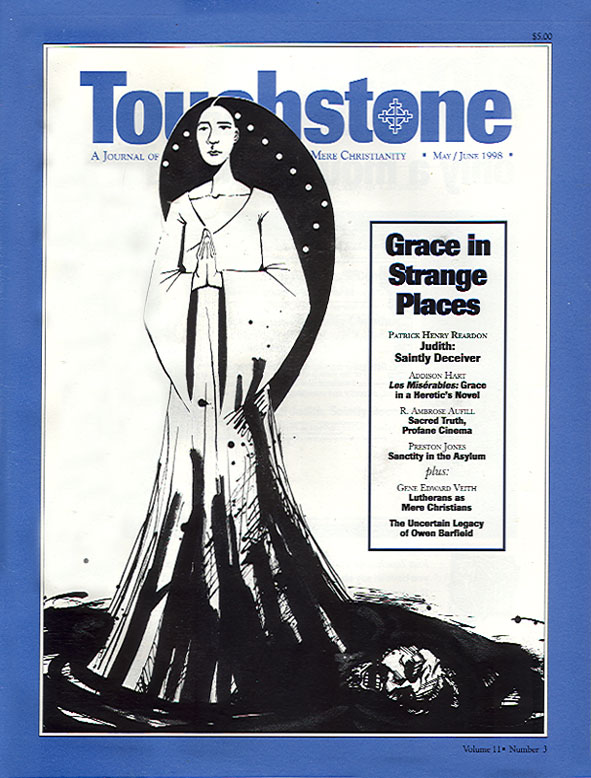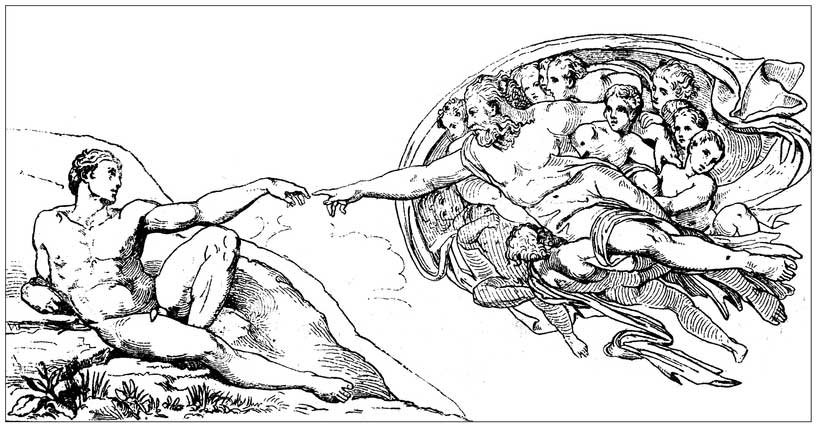Crazy or Christian?
Preston Jones on a Personal Encounter
The time came for me to say good-bye to Perry. “I’m gonna miss you, man,” he said, rattling my frame in a handshake. “I’ll pray for you first thing every morning, and Little Susie will too.” I could tell by the way he clenched his teeth that he was telling me the truth, and this was one of the very few occasions in my life thus far when I knew that if I tried to say something I would have made a scene. So I instead broke with company policy and hugged him. Then we waved good-bye to one another and I walked away. That was seven years ago, and it was the last time I saw Perry and the locked psychiatric facility that housed him.
My friendship with Perry began well before I actually met him—in the last year of an enlistment in the United States Navy, when I took a sudden and intense intellectual interest in the various forms of psychosis. I read every relevant thing I could get my hands on. So when I showed up at High Mountain Psychiatric Facility1 in Southern California a few days after my enlistment ended, I was able to dazzle its program director with a breadth of knowledge not possessed by the many of her full-time staff. I related all I knew about the most common types of schizophrenia and which psychotropic medications were most often prescribed for which disorders. I recounted the history of lithium and the results of research then taking place at the University of California at Irvine. She claimed to be very impressed but said that she was nevertheless unable to take me on as a mental health counselor since I lacked the appropriate formal credentials. I thanked her for her time, told her she should hire me in spite of her misgivings, and then waited for the job offer I knew would come—which it did, two days later. The morning after her call I ate my first breakfast at High Mountain.
On my first day there I learned that my primary responsibility was to supervise sixteen of High Mountain’s “high functioning” clients. It was in my job description to ensure that they bathed regularly; I was required to encourage them to keep abreast of current affairs; it was my job to help them learn to distinguish the real from the delusional. High Mountain’s goal for most of them was a somewhat normal life in a halfway house somewhere on the outside.
One of my charges was Old Joe, who rarely said anything and who deep down was a nice man. But the fact that he was a killer precluded him from ever being free again. Details of Joe’s crime were unavailable. All that was known was that many years earlier he and a stranger had gotten into an elevator together and everything seemed fine. When the elevator arrived at its destination, however, Joe walked off alive and placid while his riding companion did not. The only other sure thing was that Joe had committed murder with his bare hands.
Then there was Tim, a former Hell’s Angel who took himself for Napoleon or Lewis and Clark, depending on the day. Then there was poor Carlos, who was relentlessly tormented by poisonous, hallucinatory snakes.
When I first met Perry he had just finished having a fistfight with the devil. “Get away from me!” he yelled, swinging wildly in the air. “Someday I’m gonna beat that guy,” Perry said as I walked into his room for the first time.
“Who?” I asked.
“The Old Deluder.”
The question was whether Perry was as religious as he was because he was crazy, or whether he was a genuinely devout Christian who just happened to have a mental illness. At one level Perry’s preoccupation with the spiritual world was typical. As is probably the case in most psychiatric facilities, the Bible—particularly the books of Daniel and Revelation—was the text most discussed and read by High Mountain’s residents; and while the voices that accompanied their aural hallucinations were often perceived as coming from the CIA or some other government source, they were just as often construed as messages from angels, demons, both, or from the Lord himself. So Perry’s opinion that the poor quality of a particular lunch was due to the unseen machinations of spirits was nothing special.
Yet Perry was unique. For one thing, he was never given to the sort of grandiosity to which others who claimed to be in close touch with the spiritual world were prone. He never took himself as special. He did everything as best he could and to the glory of God. And he never accepted the occasional praise that was offered him for particular jobs done well. This humility extended even to his playing of pool, his favorite game.
Perry would of course object to my calling pool a mere game, since in his mind it was a spiritual battleground. “I need to go and pray about my next shot,” he said once during a match. “I’ll be back be in a minute.” And when he came back and sank the shot he had had in mind he gave thanks to God. This is how Perry was: He prayed before every shot; he cursed the devil after every miss; and when he won High Mountain’s pool tournament in the winter of 1991 he claimed his victory as a triumph for the kingdom of heaven.
Some months after I began work at High Mountain my supervisor suggested that I find some way to discourage Perry from donating his money to religious organizations. At issue here was the fact that Perry gave away fifty percent of every penny he earned; which is to say that each week he gave away five of the ten dollars he made mopping hallways. Each Sunday $2.50 went to his Baptist church and $2.50 went to Rex Humbard Ministries. Surely Perry could do some better thing with his money than that?
My supervisor went on to say that perhaps I should just discourage Perry’s religiosity altogether. As Perry’s counselor I could require him to take down all the Humbard posters he had hanging on his bedroom walls; I could demand that he stop witnessing to the nurses with the plastic “gospel glove” he picked up at a county fair; I could decline him permission to leave the facility since all he did on the streets was pass out the gospel tracts he received free in the mail; and what, my boss went on, about Perry’s lack of self-assertion? He never accepted the praise offered him but always passed it on to God. And Perry rarely grew exasperated with obstreperous residents, for goodness sake; he even let the ladies go ahead of him in meal lines. What he needed was a boost of self-confidence.
I replied that while I certainly knew that much of the religious expression at High Mountain was the stuff of delusions, I thought that Perry was different. This wasn’t to say that I believed that Perry’s closest friend, Little Susie of the Planet Ior, actually existed. Nor did I agree that Satan himself was as personally interested in High Mountain’s daily affairs as Perry thought. But, I went on, I knew a devout man when I met one, and in my view Perry was a devout man.
Thus began a low-key battle that simmered until the day I left High Mountain to attend university.
On the one side was what one might call the Establishment: psychologists, psychiatrists, and program managers. These were of the mind that if Perry ever was to live a relatively normal life on the outside, he, with their help, would have to temper his religious obsessions—and on more than one occasion High Mountain’s staff in general and myself in particular were called upon to assist them in their task. “Perry, is it appropriate”—mental health workers love to determine whether or not some behavior is “appropriate”—“for you to bring your Bible to Residents’ Council?” they would ask. “Is it appropriate for you to pray aloud over your meals?” “Is it appropriate for you to push your religion in a publicly funded institution?”
Opposite these were the silent resisters, most of whom considered Perry an insane man of sincere faith. Thus on Fridays Big Alice played gospel music for Perry to dance and shout to as he trounced the devil at the pool table; thus Milton gave Perry a radio with which to listen to Christian programs; thus I secretly prayed with Perry at the beginning of each weekday and ensured that the weekend nurses did not stand in the way of his going to church.
So Perry had no dearth of defenders. What was different for me, though, is that in time I came to view Perry as more than a fellow believer to whom life had dealt a raw deal. I came to see him as a friend.
It is of course hard to know at just what point an acquaintance or associate is transformed into a friend. I think that moment came for me when in the course of one of our conversations Perry’s upper dentures fell from his mouth with a plop to a hallway floor. Picking up his teeth, he grumbled something about the devil; I laughed; and a second later he laughed too. Then, as he would do innumerable times during my year at High Mountain, he put his right hand on my shoulder and said, “I’m glad you’re here.”
“I’m glad you’re here.” The words were an angel’s, really; for, as Perry put it, he had been praying for years that God would send a brother in faith to him and provide some relief from the Establishment. And what a real relief it was for him to have as a counselor someone who didn’t smirk at his gospel glove or deny that God might visit High Mountain with religious revival. Indeed, what a relief it was for him to be able to talk to someone without a fear of being ridiculed or censured. Even now I can hear him calling me to some quiet place where he would recount Little Susie’s latest activities.
But if that year at High Mountain was charged with a sense of mission for me, so was it for Perry, though I doubt he ever realized it. For he stands in my memory as one of the godliest men I have ever known. He was sweet of soul, infinitely kind, and quick to prayer. Save for his outbursts at the devil, I saw him lose his cool only once—a remarkable feat given the highly stressful environment in which he lived. If I were to point to a man who strove to live up to the high calling of his faith, I would point to Perry.
When I left High Mountain Perry’s health was shaky, but I know that didn’t stop him from praying for me as he said he would. And whether he is now among the living or no, I am sure he prays for me still. Perhaps Little Susie does too.
Note:
1. The institution’s real name has been changed in this article to preserve confidentiality, as required by law.
Preston Jones teaches in the Department of History at Sonoma State University in northern California, and is completing a Ph.D. at the University of Ottawa (Canada).
Preston Jones teaches history at John Brown University.
subscription options
Order
Print/Online Subscription

Get six issues (one year) of Touchstone PLUS full online access including pdf downloads for only $39.95. That's only $3.34 per month!
Order
Online Only
Subscription

Get a one-year full-access subscription to the Touchstone online archives for only $19.95. That's only $1.66 per month!
bulk subscriptions
Order Touchstone subscriptions in bulk and save $10 per sub! Each subscription includes 6 issues of Touchstone plus full online access to touchstonemag.com—including archives, videos, and pdf downloads of recent issues for only $29.95 each! Great for churches or study groups.
Transactions will be processed on a secure server.
more from the online archives
calling all readers
Please Donate
"There are magazines worth reading but few worth saving . . . Touchstone is just such a magazine."
—Alice von Hildebrand
"Here we do not concede one square millimeter of territory to falsehood, folly, contemporary sentimentality, or fashion. We speak the truth, and let God be our judge. . . . Touchstone is the one committedly Christian conservative journal."
—Anthony Esolen, Touchstone senior editor









